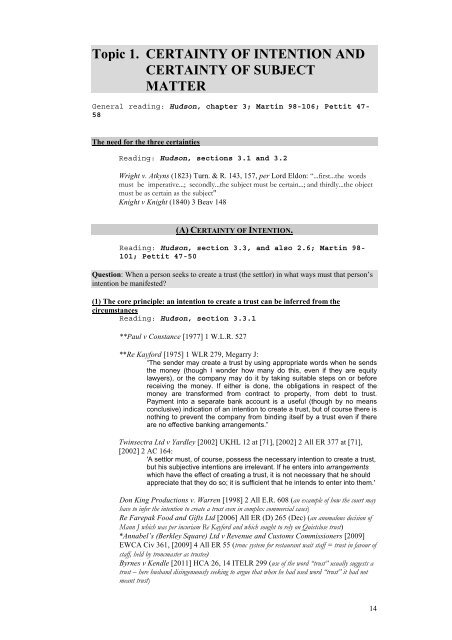Soton Equity and Trusts - alastairhudson.com
Soton Equity and Trusts - alastairhudson.com
Soton Equity and Trusts - alastairhudson.com
Create successful ePaper yourself
Turn your PDF publications into a flip-book with our unique Google optimized e-Paper software.
Topic 1. CERTAINTY OF INTENTION AND<br />
CERTAINTY OF SUBJECT<br />
MATTER<br />
General reading: Hudson, chapter 3; Martin 98-106; Pettit 47-<br />
58<br />
The need for the three certainties<br />
Reading: Hudson, sections 3.1 <strong>and</strong> 3.2<br />
Wright v. Atkyns (1823) Turn. & R. 143, 157, per Lord Eldon: “...first...the words<br />
must be imperative...; secondly...the subject must be certain...; <strong>and</strong> thirdly...the object<br />
must be as certain as the subject"<br />
Knight v Knight (1840) 3 Beav 148<br />
(A) CERTAINTY OF INTENTION.<br />
Reading: Hudson, section 3.3, <strong>and</strong> also 2.6; Martin 98-<br />
101; Pettit 47-50<br />
Question: When a person seeks to create a trust (the settlor) in what ways must that person’s<br />
intention be manifested?<br />
(1) The core principle: an intention to create a trust can be inferred from the<br />
circumstances<br />
Reading: Hudson, section 3.3.1<br />
**Paul v Constance [1977] 1 W.L.R. 527<br />
**Re Kayford [1975] 1 WLR 279, Megarry J:<br />
“The sender may create a trust by using appropriate words when he sends<br />
the money (though I wonder how many do this, even if they are equity<br />
lawyers), or the <strong>com</strong>pany may do it by taking suitable steps on or before<br />
receiving the money. If either is done, the obligations in respect of the<br />
money are transformed from contract to property, from debt to trust.<br />
Payment into a separate bank account is a useful (though by no means<br />
conclusive) indication of an intention to create a trust, but of course there is<br />
nothing to prevent the <strong>com</strong>pany from binding itself by a trust even if there<br />
are no effective banking arrangements.”<br />
Twinsectra Ltd v Yardley [2002] UKHL 12 at [71], [2002] 2 All ER 377 at [71],<br />
[2002] 2 AC 164:<br />
'A settlor must, of course, possess the necessary intention to create a trust,<br />
but his subjective intentions are irrelevant. If he enters into arrangements<br />
which have the effect of creating a trust, it is not necessary that he should<br />
appreciate that they do so; it is sufficient that he intends to enter into them.'<br />
Don King Productions v. Warren [1998] 2 All E.R. 608 (an example of how the court may<br />
have to infer the intention to create a trust even in <strong>com</strong>plex <strong>com</strong>mercial cases)<br />
Re Farepak Food <strong>and</strong> Gifts Ltd [2006] All ER (D) 265 (Dec) (an anomalous decision of<br />
Mann J which was per incuriam Re Kayford <strong>and</strong> which sought to rely on Quistclose trust)<br />
*Annabel’s (Berkley Square) Ltd v Revenue <strong>and</strong> Customs Commissioners [2009]<br />
EWCA Civ 361, [2009] 4 All ER 55 (tronc system for restaurant wait staff = trust in favour of<br />
staff, held by troncmaster as trustee)<br />
Byrnes v Kendle [2011] HCA 26, 14 ITELR 299 (use of the word “trust” usually suggests a<br />
trust – here husb<strong>and</strong> disingenuously seeking to argue that when he had used word “trust” it had not<br />
meant trust)<br />
14













